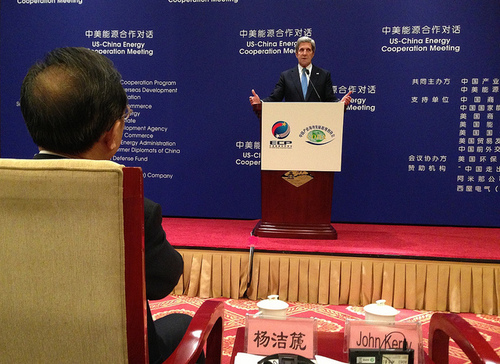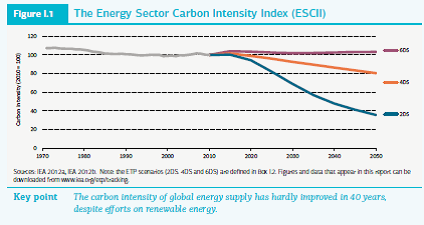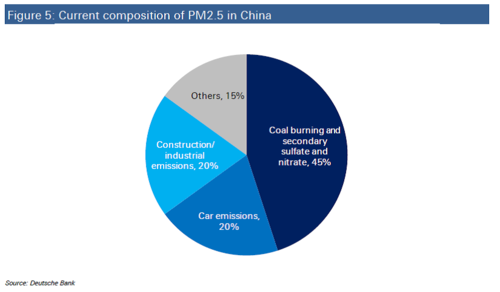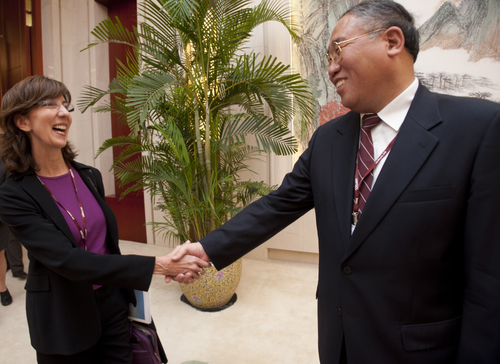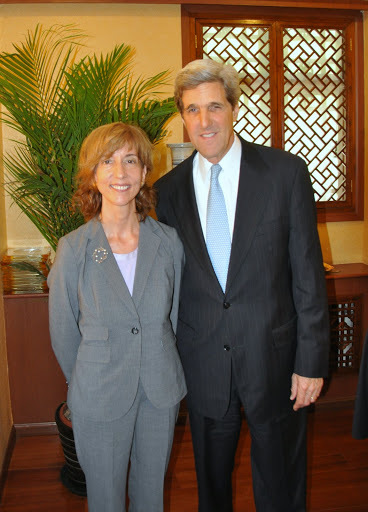The new Joint U.S.-China Statement on Climate Change, signed during Secretary of State John Kerry's trip to China last week, is a remarkable document. Using the strongest possible diplomatic language, the statement clearly displays a new sense of urgency about the dangers of climate change and the need for stronger coordinated efforts in addressing the issue. Of note, the two countries responsible for more than 40% of global GHG emissions underscored the broad consensus among the scientific community about anthropogenic climate change and its accelerating impacts, calling for "forceful, nationally appropriate action by the United States and China - including large-scale cooperative action" that could "set the kind of powerful example that can inspire the world." We hope that the two sides can live up to this strong language with the kinds of action that significantly cut U.S. and Chinese carbon pollution.
Photo Credit: U.S. Department of State
Here are some reasons why this new joint statement is important.
It recognizes the inadequacy of the global response: In its new report, Tracking Clean Energy Progress 2013, the International Energy Agency delivers a stark message: that the global transformation to low-carbon energy is advancing too slowly to limit global warming. The IEA said that "unless we get 'carbon emissions' prices and policies right, a cost-effective clean-energy transition just will not happen." The joint statement calls for a fast-track, scaled-up and focused initiative that will reflect this compelling call to action.
It calls for intensified, scaled up cooperation: China already recognizes the need for a massive long-term effort to tackle its worsening air pollution crisis. Deutsche Bank says that "big bang measures" are necessary, including policies that will reduce coal usage by half over the next four years, cut automobile demand, and "massively" increase investment in energy efficiency, clean energy, and public transit. The good news is that the measures China needs to take to alleviate PM 2.5 air pollution will also reduce greenhouse gas emissions and vice versa.
It represents a major shift in bilateral climate relations: The U.S. and China have been engaged in climate dialogue and cooperative projects for years, with a breakthrough in 2009 when the two countries signed their first climate-focused agreement (which I blogged about here), as well as a package of clean energy partnership initiatives including the US-China Clean Energy Research Center (CERC) (NRDC is a partner in the CERC for Building Energy Efficiency). Yet starting in Copenhagen, the two countries have often been at odds in the international climate negotiations, and by the time the two countries met for their last Strategic &Economic Dialogue (S&ED) in May 2012, climate change merited little more than a mention near the end of a long list of bilateral issues.
The new joint statement, in contrast, recognizes that "working together both in the multilateral negotiation and to advance concrete action on climate change can serve as a pillar of the bilateral relationship, build mutual trust and respect, and pave the way for a stronger overall collaboration." As one former climate negotiator said, "I bet whoever helped draft the statement was not in Copenhagen."
That is probably not completely true, since the joint statement establishes a Climate Change Working Group led by the two people who have been in charge of the bilateral climate negotiations for years: U.S. Special Envoy for Climate Change Todd Stern, and Vice Chairman of China's National Development and Reform Commission (NDRC) Xie Zhenhua. I suspect that it will be a welcome assignment for the two officials, who are well aware of the work both countries are doing to reduce emissions, as well as the mutual benefits of working together to strengthen those efforts.
I do not believe, however, that either side will use this new partnership as a vehicle to seek a tacit agreement that could jeopardize a meaningful international climate agreement. In nearly three decades in the U.S. Senate, John Kerry has distinguished himself as a champion for action against climate change, including meaningful cooperation with China. In a 2009 report by the Senate Foreign Relations Committee, Broadening the Bilateral: Seizing the Opportunity for Meaningful U.S.-China Collaboration on Climate Change, Secretary Kerry stated plainly:
"It is worth noting that these bilateral negotiations support and do not supplant the multilateral process...[W]ithout some kind of understanding between the United States and China in advance of these talks, it will be very difficult to reach a robust treaty."
Meeting with then-Senator Kerry in Beijing at the 2009 U.S.-China Clean Energy Forum
In the same report, Todd Stern also noted, "If the two goliaths on the world stage can join hands and commit each other - at the highest level - to a long-term, vigorous climate and energy partnership, it will truly change the world."
As my colleague Jake Schmidt has explained, real climate progress, including a strong international climate agreement, will only occur if key countries work to turn their climate commitments into specific actions at home. Through this joint statement, the U.S. and China have signaled that they'll take a significant and desperately needed step forward. But they must now work hard and fast to translate these promising words into concrete action.
Next up: some detailed recommendations for concrete cooperation between the two countries.
This was coauthored by my colleagues Christine Xu, Alvin Lin and Jake Schmidt.

